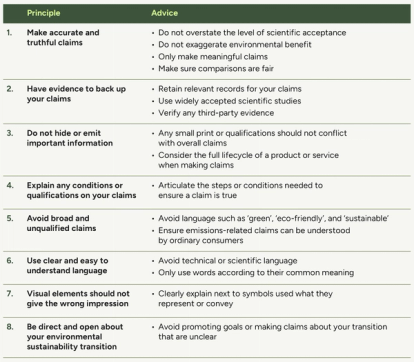
Understanding sound flanking: Fire alarm speaker cable conduits in multi-family buildings
by Neil Vyas
View post

In 2023, we saw concerns around the "greenwashing" trend like never before. As we step into 2024, the tide is only going to continue. So, what is it? Why does it matter? And what should you do about it?”
Firstly, let’s take a step back and understand what ‘greenwashing’ means. The act of ‘greenwashing’ is where a business uses any claim, or omits key information, that makes a product or service seem better or less harmful for the environment than it really is[1].
Saying things like “this product is made from 100% recycled products” when only 50% is, or companies stating they have green sustainability goals while lacking credible plans to achieve them, are considered greenwashing.
You may be hearing about it because both the (Australian Competition and Consumer Commission) ACCC and Australian Securities and Investments Commission (ASIC) are both seriously cracking down on Australian businesses who make greenwashing claims, as ACCC Chair Gina Cass-Gottlieb puts it: “False or misleading claims can undermine consumer trust in all green claims, particularly when consumers are often paying higher prices based on these claims.”[2]
Greenwashing is a problematic practice because overstating, misrepresenting, or misstating such claims erodes consumer and investor trust, exposes businesses to regulatory risks and distorts fair competition.
It is also illegal behaviour according to the Corporations Act 2001 and Australian Consumer Law. It dupes current or potential investors, customers, and the wider community into thinking businesses, products, or corporate activities are more sustainable than they actually are.
Let’s consider it from different perspectives…
In an ‘internet sweep’ in 2022, the ACCC found that 57% of the “green” claims made by 247 businesses were vague and unsubstantiated. ASIC have also commenced litigation against several companies over their alleged false, misleading or unsubstantiated claims[3].
Whether companies unintentionally make greenwashed claims, some contributing factors include:
This contributes to uncertainty and inconsistency around sustainability claims.
Yes. Recent research has indicated that some companies are choosing not to voluntarily report their ESG performance[4],[5] due to the uncertainty over what to report on or the risk of backlash should they be found to be greenwashing. This is known as ‘greenhushing’.
While it is important to be cautious, this can be missed opportunity to build trust with stakeholders, including investors, customers, and employees. Transparency and balance in reporting and disclosure not only helps demonstrate a commitment to sustainability but also allows stakeholders to make informed decisions and hold all companies accountable for their claims.
The launch of International Financial Reporting Standards’ (IFRS) International Sustainability Standards Board (ISSB) to provide a global baseline for sustainability disclosures is a positive step in this direction - in Australia, the upcoming Australian Sustainability Reporting Standards (ASRS) on climate-related disclosures also signals the momentum towards more accountability.
It can be difficult to spot greenwashing, but by being conscious of it you might take notice of:
In December 2023, the ACCC published its guide for business which offers eight universal principles for making trustworthy environmental claims – here is a snapshot

A materiality assessment is great first step to safeguard yourself against greenwash claims, by understanding where your organisation has impact and how your consumers perceive this impact.
Understanding the ACCC's Greenwashing Guidelines is vital for businesses aiming to build a strong brand reputation based on authenticity and transparency. You can also get some pointers from ASIC’s Information Sheet on how to avoid greenwashing when promoting products. By avoiding misleading environmental claims, companies can earn consumer trust while contributing towards a greener future.
If you would like more information on best-practice sustainability commitments and communication, please reach out to Tess or any of our ESG team.
[1] Environmental and sustainability claims | ACCC
[2] ACCC publishes draft guidance to improve businesses' environmental claims | ACCC
[3] ASIC launches first Court proceedings alleging greenwashing
[4] Net Zero and Beyond - South Pole’s 2022 net zero report
[5] What is ‘greenhushing’ and is it really a cause for concern? | World Economic Forum (weforum.org)

by Neil Vyas

